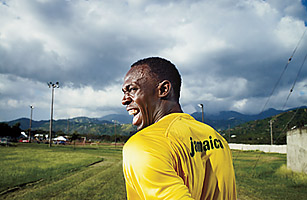
(2 of 4)
From Trelawny to "the World"
Talk to any of the people who knew Bolt as a boy, and they'll tell you he's been a spirited sprinter since childhood. To find Bolt's beginnings, head a few hours north from the Jamaican capital, Kingston, through the hills where kids — animal and human varieties — roam along roads so narrow that a car nearly swerves into a stone wall as it dodges oncoming traffic. Pass the resorts on the northern coast and enter the parish of Trelawny, a sugar-farming area that was the former stronghold of the Maroons, Jamaica's 18thcentury freedom fighters who resisted British slavers. Exit the highway and journey south, deep into the heart of Cockpit Country, the rugged, nearly impenetrable region of the interior so named, according to one theory, because it reminded the 17th century British of the humid cockfighting pits back home.
Make a right at the mural of Bob Marley, Marcus Garvey and other national heroes, pass the shanty homes with pigs wandering in the front yards. You enter Bolt's home village, Sherwood Content, and drive by the stone-strewn grass "track" where Bolt ran as a boy. Two children off the side of the road are holding machetes. Don't worry; the locals use them to cut sugarcane.
You finally arrive at the dimly lit grocery shop run by Wellesley Bolt, 53, thin and stretched out like his son. At 8:30 on a Sunday morning, he is hunched over, scooping sugar for his customers. There's absolutely no indication that this store belongs to the father of the world's best athlete. The only signs out front encourage safe sex and HIV testing. Brand consultants don't quite make it into Cockpit Country.
Why not trade on his famous name and attract tourists to fill his coffers? Wellesley doesn't want the hassle. "I told him, 'Yo, Dad, stop working,'" says Usain, who this year took in $3 million to $4 million in endorsement income from the likes of Puma, Gatorade and local phone provider Digicel. "'I can take care of you guys.' He's like, 'Nah.' He wants something to do. He's a guy who likes to be independent."
Wellesley was strict, ordering Usain to carry buckets of water for miles back to their home, which had no running water, so that the family could cook and clean. Usain credits chores like that with helping build his wiry strength. "Those were my weights," he says. "In the country, you always find something to do. Go through the bushes, ride your bicycle, go walking. So you work your muscles when you're young."
Wellesley would often duck out of work — during Usain's youth, he toiled in the coffee fields — to visit Usain at school and make sure he was keeping up with training. Wellesley explains that if Usain fell out of line, he would just smack him. In the face? "No, we don't do that," says Wellesley. "On the hand — or even better, on the back." He grins. "It paid off." Bolt's first love was cricket, the sport that's still the favorite of many West Indian islanders. Then, one day on the cricket pitch, his coach spotted his speed and diverted him to the track. At 15, Bolt became the youngest-ever world junior champion in the 200m, and he set age-group records over five years.
These achievements were in no way a measure of his work ethic, since he didn't have one. "I was really lazy," Bolt admits. "I was coming out of high school doing absolutely nothing." Jamaicans wrote him off after disappointing performances in the 2004 Athens Olympics and the 2005 world championships in Helsinki. At both events, he fought injuries — and indifference. A month before the '04 Games, Pascal Rolling, a Puma marketing executive, spent time working with Bolt in Germany. "We literally had to fight him every day to get him to the track," says Rolling. "I remember him saying, 'Don't worry. I'm going to be an Olympic champion.' I thought, You are f______ crazy. You have no clue."